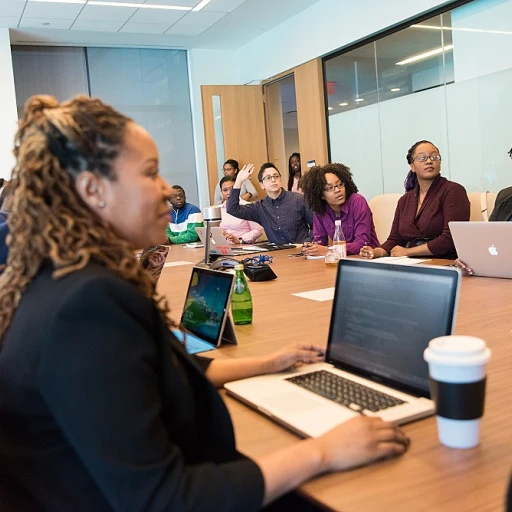
Understanding the Core Responsibilities
Defining Key Objectives
In understanding the core responsibilities of a people manager, it's crucial to hone in on the main objectives that make this role successful. People managers are at the heart of any effective team, and their primary responsibility is to ensure that each team member feels valued, supported, and empowered to perform at their best. This involves not just overseeing tasks but fostering a positive work environment and enabling employee development.Cultivating Business Growth
A people manager must align the team's goals with the broader business objectives, ensuring that team members’ efforts contribute to the success of the organization. This includes strategically planning for training and development, managing performance effectively, and ensuring that employees receive constructive feedback regularly. By doing so, they help to drive the performance and productivity of their teams, which is essential for maintaining competitive advantage in a rapidly evolving market.Promoting Employee Engagement
Employee engagement plays a significant role in achieving business success. People managers need to actively nurture relationships within the team and support open communication channels where feedback can be freely given. This creates an environment that values each individual's input, leading to improved morale and job satisfaction. Enhanced engagement not only leads to a positive work atmosphere but also boosts team performance.Performance Management and Development
Effective performance management is a cornerstone of the people manager's role. Managers must be adept at providing clear communication regarding business expectations and development opportunities. They should facilitate regular performance reviews, setting realistic and challenging goals while also investing in the training and development of their team. This approach ensures the continuous growth of employees' skills and competencies, vital for both personal career advancement and organizational success. By understanding these core responsibilities, managers can better navigate the diverse challenges they face in managing people. The skills required for this role are dynamic and multifaceted, demanding continuous learning and adaptation.Effective Communication Strategies
Mastering Conversations for Maximum Impact
Communication is the backbone of successful people management. An effective people manager understands that open communication paves the way for a thriving work environment where team members feel valued and heard. The art lies in crafting messages that are clear and inspire action, encouraging a culture of transparency and mutual respect.
To enhance communication skills, managers should focus on the following strategies:
- Encourage open feedback: Create a safe space where employees can express their concerns and ideas without fear. This not only helps in identifying potential issues early but also boosts employee engagement.
- Active listening: Show genuine interest in what your team members are saying. This involves not just hearing words but understanding and acknowledging their feelings and perspectives.
- Be adaptable: Different team members may require different communication approaches. Tailor your style to suit the individual needs and preferences of your team.
- Clarity and conciseness: Avoid jargon and over-complicated explanations. Clear and direct communication fosters efficiency and reduces the risk of misunderstandings.
Managers who excel in communication not only improve team performance but also support the development of their employees by providing constructive feedback and guidance. This aspect of their role is crucial in managing people, as it sets the foundation for building a positive work environment.
For those looking to deepen their understanding of communication strategies and other aspects of this role, resources like the exploring the role of a business continuity manager can provide valuable insights into professional mentoring.
Emotional Intelligence in Leadership
Fostering a Culture of Empathy and Understanding
In the dynamic realm of people management, emotional intelligence emerges as a cornerstone of effective leadership. It’s an intricate tapestry woven with understanding, empathy, and the ability to connect genuinely with team members. For people managers aiming to elevate their teams' performance and foster a thriving work environment, refining emotional intelligence can be pivotal. For everyone in management roles, honing these skills can result in significant improvements across their responsibilities. Emotional intelligence involves recognizing and managing our own emotions, as well as the emotions of others. This nuanced comprehension is not limited to detecting stress or satisfaction; it extends to acknowledging silent struggles and unspoken tensions that may affect employee engagement and performance.- Promoting Open Communication: Developing an environment where people feel heard is essential. Encourage open communication, where employees can express concerns or ideas without fear of reprisal. Such practices not only bolster morale but also enhance trust in leadership, making team members feel included and valued.
- Enhancing Conflict Resolution Skills: Differences among team members are inevitable. Here, emotional intelligence plays a crucial role in resolving conflicts effectively. By navigating challenges and understanding diverse perspectives, managers can mediate disputes with fair conflict resolution methods, maintaining harmony and productivity.
- Providing Constructive Feedback: Feedback is a tool for growth and development. When delivered with emotional intelligence, constructive feedback becomes a powerful motivational factor, enhancing employee performance and driving the success of the organization. This approach ensures that feedback is received positively and acted upon effectively, boosting both individual and team development.
- Cultivating a Positive Work Environment: By fostering a positive workplace ambiance, managers contribute to a culture of continuous learning and development. Promoting empathy and inclusion within the team encourages team members to reciprocate such values, ultimately fortifying the organization’s success.
Mentoring for Professional Growth
Guiding the Journey to Professional Excellence
Mentoring isn't just about sharing knowledge; it's the bridge between the aspirations and accomplishments of your team. As a people manager, your role is pivotal in facilitating professional growth and development among employees. This commitment can significantly enhance the overall performance and success of your team.People managers are in a unique position to influence employee development by providing valuable insights and constructive feedback. An effective mentor guides team members in identifying their strengths and areas for improvement, fostering a work environment where continuous learning is encouraged. This leads to a positive work culture where individuals feel supported in their career paths.
- Setting Goals: Collaborate with employees to set realistic and challenging goals that align with both personal aspirations and organizational objectives. This helps bridge the gap between individual growth and business success.
- Providing Feedback: Regular and open communication is essential when guiding others. Offering timely, constructive feedback allows employees to adjust their performance and fine-tune their skills, contributing significantly to their professional journey.
- Identifying Training Needs: Recognize the need for specific training and development opportunities. This might involve recommending specialized courses or facilitating in-house skill-building sessions that will empower team members to excel in their roles.
- Promoting Self-awareness: Encourage employees to engage in self-reflection and recognize their own capabilities and areas for growth. An insightful self-assessment can dramatically enhance personal and professional development.
- Building Relationships: Establishing trust and fostering genuine relationships with team members lays the groundwork for effective people management. This connection helps in understanding their individual needs and tailoring your mentoring approach accordingly.
The responsibility of mentoring extends beyond guiding professional development. It is about creating a culture that supports both personal growth and team performance. By encouraging open communication and providing continuous support, people operations become more efficient, leading to enhanced employee engagement and contribution to the success of the organization.
Navigating Challenges and Conflict
Addressing Challenges with Confidence
In the realm of people management, challenges and conflicts are inevitable. Whether it's a disagreement between team members or a misalignment of goals, effective people managers must be equipped with the skills to navigate these situations with confidence and poise.
One of the key responsibilities of a people manager is to foster a positive work environment where open communication is encouraged. This involves creating a safe space for employees to voice their concerns and providing constructive feedback. By doing so, managers can address issues before they escalate, ensuring a harmonious work life for all team members.
Implementing Conflict Resolution Strategies
Successful conflict resolution requires a strategic approach. Managers should employ techniques that promote understanding and collaboration among team members. This includes active listening, empathy, and the ability to mediate discussions effectively. By honing these management skills, managers can transform potential conflicts into opportunities for growth and development.
Moreover, it's essential for managers to remain impartial and objective when dealing with conflicts. This helps in maintaining trust and credibility within the team, which is crucial for employee engagement and performance management.
Continuous Development and Support
To navigate challenges effectively, managers should invest in their own development as well as that of their team. Providing training and support for employees not only enhances their skills but also prepares them to handle conflicts independently. This proactive approach contributes to the overall success of the organization by building a resilient and adaptable workforce.
In conclusion, managing people involves a delicate balance of addressing challenges, supporting employee development, and fostering a culture of continuous learning. By mastering these aspects, people managers can lead their teams to success and create a thriving work environment.
Building a Culture of Continuous Learning
Fostering an Environment for Continuous Growth
Creating a culture that values continuous learning is an essential aspect of people management. It requires a proactive approach to support employees in their professional development, enabling them to acquire new skills that contribute to the success of the organization. Implementing programs and creating opportunities for team members' growth can transform an ordinary work environment into a powerhouse of performance and innovation.
Here are some strategies people managers can employ to build a culture of continuous learning:
- Establish Clear Learning Goals: Setting clear developmental goals for each employee is crucial. This requires effective communication to understand individual aspirations and align them with the team's objectives.
- Implement Regular Training: Organizing training sessions tailored to the needs of your employees helps enhance their skill set. Regular workshops and professional courses can be great resources for employee development.
- Encourage Open Feedback: A positive work environment thrives on open communication. Creating channels for honest and constructive feedback can drive continuous improvement and greater employee engagement.
- Leverage Peer Learning: Encourage team members to share knowledge and learn from each other. This peer-based approach not only reinforces learning but fosters a sense of community and collaboration.
- Support and Recognize Growth: Acknowledge and celebrate the progress and achievements of your employees. Recognition boosts morale and motivates people to strive for further development.
Building a thriving work culture that values growth begins with the commitment of people managers. By prioritizing employee engagement and development, the organization can achieve outstanding performance, benefiting both the team and the business as a whole.













